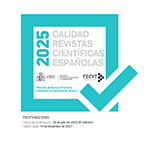How Spanish Journalists consider minorities and vulnerable groups should be treated by media
Abstract
The majority of the general European codes include among their principles that professionals have a duty not to discriminate for reasons of sex, of etnia (or of race) and of religion. Some texts go beyond and speak about the national, cultural or social origin, language or ideology. This study focuses on how much are assumed these guidelines in the professional activity of journalists from four regions (autonomous communities) that add up to more than half of population of Spanish state (52 %): Andalusia, Catalonia, Madrid and Basque Country. The discrimination affects often to groups that are socially or economically deprived or marginalized -as immigrants, women, homosexuals, disabled and elderly peopleand, besides the usual questions that arise in this area, news people are faced with the issue whether is it admissible to act with some kind of ‘positive discrimination’.Downloads
Article download
License
In order to support the global exchange of knowledge, the journal Estudios sobre el Mensaje Periodístico is allowing unrestricted access to its content as from its publication in this electronic edition, and as such it is an open-access journal. The originals published in this journal are the property of the Complutense University of Madrid and any reproduction thereof in full or in part must cite the source. All content is distributed under a Creative Commons Attribution 4.0 use and distribution licence (CC BY 4.0). This circumstance must be expressly stated in these terms where necessary. You can view the summary and the complete legal text of the licence.










